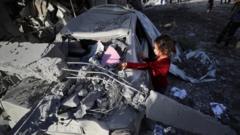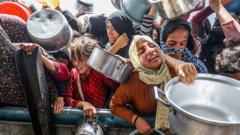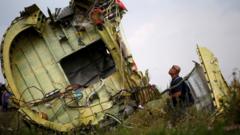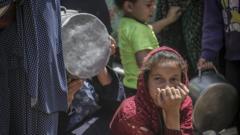A BBC cameraman, while documenting the dire situation of malnourished children in Gaza, narrowly escaped injury when an Israeli strike hit near a hospital. Focused on a five-month-old infant, Siwar, suffering from severe malnutrition, the report highlights the urgent need for humanitarian aid and the grim impact of conflict on innocent lives.
The Heart-Wrenching Reality of Gaza's Starving Children Amid Israeli Strikes
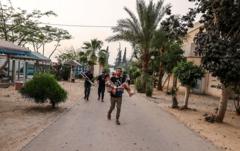
The Heart-Wrenching Reality of Gaza's Starving Children Amid Israeli Strikes
A BBC cameraman captures the tragic human cost of the ongoing conflict in Gaza, shedding light on the malnourishment crisis faced by children amidst violence.
The horrors of war continue to unfold in Gaza, marked by profound human suffering, particularly among the region's children. A recent incident involving a BBC cameraman underscores the escalating peril faced by journalists documenting this crisis. On Tuesday, an Israeli airstrike targeted the European Hospital in Khan Younis, resulting in numerous casualties and leaving many wondering about the ethics of such military operations. The Israeli military claims that Hamas leaders were using the hospital for operations, yet Hamas refutes these allegations.
The cameraman, whose name has not been disclosed for safety reasons, was fortunate to escape serious injury during this tragic event. The aftermath revealed a scene of chaos, with families, including one father, wounded amidst their desperation to secure medical treatment for children. Distressing visuals captured show the journalist comforting terrified children, a stark reminder of the conflict's impact on the young and vulnerable.
Central to this narrative is the plight of five-month-old Siwar Ashour, a child battling severe malnutrition. Her mother, Najwa, shared her harrowing story through a video message from Nasser Hospital, expressing a mother’s anguished wish for her child's recovery. Siwar's health has been deteriorating due to the blockade limiting access to essential food supplies and medical care.
Amid this despair, there are signs of hope, as medics at a nearby field hospital managed to procure some specialized formula needed for Siwar, reflecting the ongoing efforts to alleviate the suffering under dire circumstances. Meanwhile, plans to evacuate a number of sick children to countries like the UAE and Jordan are in motion, though these require strict coordination with Israeli authorities.
As families face the unthinkable situation of separation and fear for their loved ones, the stories of individuals like Abdelrahman al-Nashash, who lost a leg due to bombing and now lives in relative safety, highlight the complexities of returning to a war-torn homeland. Their experiences speak to the unbreakable bond of family ties and the deep-seated longing for a return to peace.
In light of these harrowing accounts, the conflict raises critical ethical questions regarding the human cost of military operations in populated areas. Unresolved issues concerning food access and civilian welfare continue to plague the situation, as international organizations call attention to what is viewed as a weaponization of resources, exacerbating the humanitarian crisis.




